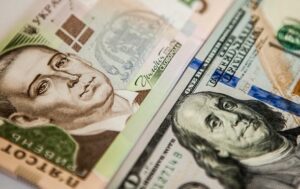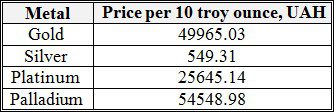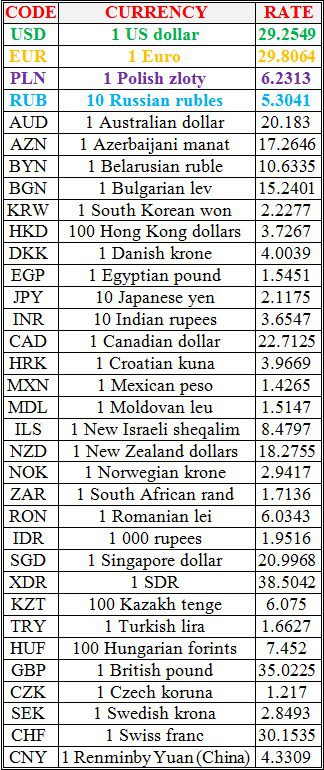
From 09:00 on July 21, 2022, the National Bank of Ukraine adjusted the official exchange rate of the hryvnia against the US dollar by 25% – from UAH 29.2549/$1 to UAH 36.5686/$1, taking into account changes in the fundamental characteristics of the Ukrainian economy during the war and strengthening of the US dollar against other currencies, according to a message on the NBU website.
“Such a step will increase the competitiveness of Ukrainian producers, bring together the exchange rate conditions for different business groups and the population and maintain the stability of the economy in a war,” the National Bank said.
He stressed that the official exchange rate of the hryvnia against the US dollar continues to be fixed.
“With the high uncertainty caused by the war, a fixed official exchange rate against the US dollar is the main anchor for stabilizing expectations and a key means of achieving the NBU’s priority goals. They are to ensure price and financial stability, which is an important condition for economic recovery,” the regulator explains its position.
Central bank official rates of banking metals as of July 21

One troy ounce=31.10 grams
National bank of Ukraine’s official rates as of 21/07/22

Source: National Bank of Ukraine

More and more investors are pessimistic about the prospects for the global economy and corporate profits, according to the results of a monthly survey of fund managers conducted by Bank of America Corp. (BofA).
According to the results of the July survey, the proportion of respondents who expect the economy to weaken in the next 12 months reached a record 79%, an increase of 6 percentage points (p.p.). The share of investors expecting corporate earnings to worsen over the next 12 months rose by 7 percentage points, also reaching 79%.
Stagflation in the global economy is expected by a record 90% of respondents compared to 83% a month earlier.
The survey, which included 259 investors managing $722 billion in assets, was conducted by BofA last week.
Investors have reduced exposure to risky assets to lows not seen even during the global financial crisis, “completely capitulating” in the face of a bleak economic outlook, BofA said.
The share of stocks in investment portfolios this month fell to the lowest since the collapse of investment bank Lehman Brothers in 2008, the share of cash balances reached 6.1%, the highest since October 2001.
Among the biggest risks, fund managers point to high inflation, a global recession, and a hawkish central bank.
At the same time, the proportion of respondents who expect inflation to slow down next year has reached its highest level since the global financial crisis.
BofA has been conducting surveys of fund managers since 1994.

First Lady of Ukraine Olena Zelenska and First Lady of the United States Jill Biden discussed the National Program for Mental Health and Psychosocial Support, as well as a number of humanitarian projects, during the meeting, the press service of the Office of the President of Ukraine reports.
“As part of her visit to the United States, First Lady of Ukraine Olena Zelenska met with First Lady of the United States of America Jill Biden at the White House. The wife of the Ukrainian head of state was also met on the porch of the White House by US President Joseph Biden and Vice President Kamala Harris. During the event, discussed the National Program for Mental Health and Psychosocial Support, the implementation of which was launched in Ukraine,” the message posted on the website on Wednesday evening reads.
It is noted that for the implementation of the National Program for Mental Health and Psychosocial Support, “expert consultations of foreign, including American, specialists in overcoming the consequences of traumatic situations caused by the war are needed.”
“The first ladies of Ukraine and the United States paid considerable attention to a number of humanitarian projects aimed at alleviating the suffering of people affected by the war. In particular, they talked about the treatment of Ukrainian children in the United States and their prosthetics in American clinics, as well as a number of educational initiatives and assistance to temporary internally displaced persons,” the statement said.
In addition, Zelenskaya met with Douglas Emhoff, the husband of Vice President Kamala Harris.
The meeting, which was held in an expanded format, was also attended by US Ambassador to the UN Linda Thomas-Greenfield, US Chief Medical Officer Vivek Merty, Assistant Secretary of State for Political Affairs Victoria Nuland, USAID First Deputy Administrator Isabelle Coleman, US National Security Council Senior Director for Europe Amanda Sloat.
The First Lady of Ukraine emphasized that “the main thing today is the supply by the United States of Ukraine of powerful precision weapons that will help us protect children and civilians, as well as accelerate victory in the war.”
In addition, Zelenskaya “told about the project ‘The Book of the Executioners of the Ukrainian People’, which collects confirmed data on war criminals from the Russian army.”
The wife of the head of the Ukrainian state thanked the United States for significant efforts in the UN for isolation and deprivation of a seat in the UN Human Rights Council of the Russian Federation, as well as for condemning Russia, and called for further strengthening of sanctions and recognizing the Russian Federation as a state sponsor of terrorism.
On the second day of her visit to the United States, Olena Zelenska had lunch with influential American women.
It was attended by Marcy Kaptur – congresswoman, co-chair of the Ukrainian caucus in Congress; Robin Dunnigan – Deputy Assistant Secretary of State for European and Eurasian Affairs; Dr. Beth van Skak, US Department of State Ambassador-at-Large for Global Criminal Justice, and others.
“The concept of a “strong woman” is the same in Ukraine and in America: a woman takes responsibility and makes decisions in the most difficult situations. She told the American “power women”, among whom are diplomats and senators, about strong Ukrainian women. This is how each of us is now “About those fighting in the ranks of the Armed Forces of Ukraine, who go to work under shelling, who start all over again in a new place for the sake of children. We have a whole country of power women!”, the First Lady of Ukraine stressed.

Salateira chain of salad bars is looking for opportunities to enter the Turkish market, Chairman of the Board of the International Association of Turkish and Ukrainian Businessmen (TUİD) Burak Pehlivan said.
“Salateira … made the decision to make its first investment in Turkey. It was interesting to hear from Alexander Savilov, founding partner of Saleteria, about the company’s ten-year journey of success, and to assess with him why and how they want to enter the Turkish market,” he wrote on Linkedin.
Alexander Savilov, co-founder of the Salateira salad bar network, noted in the comments to the post that they are currently looking for a partner in Turkey.
Salateira is an international fast healthy chain with the principle of free choice of ingredients. According to the site, the network includes 20 restaurants in Kyiv, Dnipro and Odessa, as well as 5 abroad – in Minsk (Belarus).